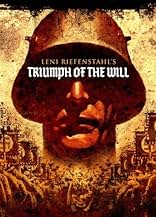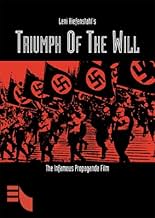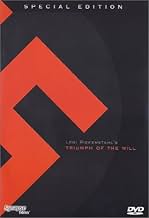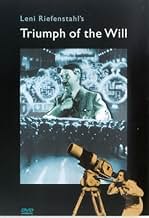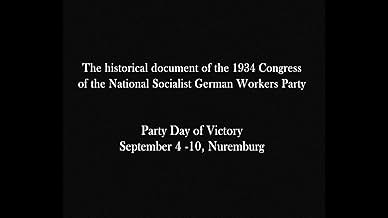VALUTAZIONE IMDb
7,1/10
19.214
LA TUA VALUTAZIONE
Uno sguardo al famigerato film di propaganda del raduno del partito nazista del 1934 a Norimberga, in Germania.Uno sguardo al famigerato film di propaganda del raduno del partito nazista del 1934 a Norimberga, in Germania.Uno sguardo al famigerato film di propaganda del raduno del partito nazista del 1934 a Norimberga, in Germania.
- Regia
- Sceneggiatura
- Star
- Premi
- 1 vittoria e 1 candidatura in totale
Recensioni in evidenza
There is scarcely a review which doesn't focus on the meaning or message contained within this film.
I don't mean to suggest that those elements don't exist; I merely want to suggest that there is much more in this powerful film.
Like Olympia, this is a masterfully crafted work of art.
I don't mean to suggest that those elements don't exist; I merely want to suggest that there is much more in this powerful film.
Like Olympia, this is a masterfully crafted work of art.
10GBinAZ53
Triumph Des Willens was a blockbuster film in a number of ways. It was meant to be a proper memorializing of an annual NSDAP Parteitag held in Nurenburg. A prior attempt, Sieg Des Glaubens, had proved to be a failure. Adolf Hitler gave director Leni Riefebstahl full rein to use all means to make this film the success which he wanted. First, many innovations in camera techniques, sound synchronization, storyboarding, staging, etc., made movie history. Second, it was an overt appeal to the emotions of both Germans and foreigners that suggested the excitement for and the apparent power of the new Third Reich. Third, the film was part of a multimedia campaign ahead of its time. Its success was confirmed for many years by the almost universal ban most countries placed on its showings. And sixty years later it is still effective in both thrills and chills. Highlights: the first 20 minutes or so resemble a media drama; the solemn military reviews demonstrate components of state power; speeches illustrate the personnel in power at the time. Quite a package!
This film can only be judged or analyzed in any meaningful way only by those who can envision Germany and its people with the hindsight of the decade following its defeat in WWI and the ensuing economic chaos of the 1920s. For those of us who can objectively remove ourselves from our time and revisit the year in which it was filmed, 1934, and then compare it only with all other films made during that early part of the 20th Century can we locate the single word describing it
astonishing.
We are called to objectivity when commenting on a book or film, a piece of art, or product. Only when that is accomplished does a comment have any enduring and meaningful value. Another thing I have found astonishing about this film and its creator is the seemingly unique inability of those commenting on it to be objective. It is seen in the overwhelming number of cases, not from the time in which it was made but with the hindsight of decades of history that had not yet taken place.
We are called to objectivity when commenting on a book or film, a piece of art, or product. Only when that is accomplished does a comment have any enduring and meaningful value. Another thing I have found astonishing about this film and its creator is the seemingly unique inability of those commenting on it to be objective. It is seen in the overwhelming number of cases, not from the time in which it was made but with the hindsight of decades of history that had not yet taken place.
10EdgarST
After winning elections, the National Socialist Party of Germany held a congress in 1934, a demonstration of force that was filmed "to show the world the triumph of the will of the German people." From the opening when the Führer literally arrives from heaven and the healthy, disciplined and pure Arian party members gather in Nuremberg, the documentary goes from the particular to the general with clever audiovisual manipulation, through marches, speeches and banners, turning the masses that celebrate the triumph of their will into a perfect piece of architecture, a magnificent structure that is reduced to the power of the Party. For decades, this so-called work of "reactionary modernism" was dismissed after the revelation of the Nazis' iniquity. However, after emotions are subdued, the masterfulness of director Leni Riefenstahl is evident (see "Die Match der Bilder.") In this and her 1938 film of the Olympic Games in Berlin, "Olympia", she coined techniques that today are common place in the entertainment industry. So don't be surprised if today you watch a football game with technical solutions of Nazi origin...
....although, in this case, once may be more than enough for some people. It's technically innovative, with several amazing camera shots, but the content is hollow and repetitive; if you make it through the endless parade footage, Hitler's final speech is the most inflammatory - and revealing. One thing that is made clear, however, is how hypocritical it is to retroactively condemn director Leni Riefenstahl for being seduced by the Nazi ideology at that point in time, when millions of Germans (and others around the world) were far more vocal in their support of the Fuhrer. *** out of 4.
Lo sapevi?
- QuizThe film spent six months in the editing suite. The two-hour running time represents approximately 3% of the footage Leni Riefenstahl shot.
- Citazioni
[last lines]
Rudolf Hess: The Party is Hitler. But Hitler is Germany as Germany is Hitler! Hitler, Sieg Heil! Sieg Heil!
crowd: Heil! Heil! Heil!...
- Versioni alternativeThere is an Italian DVD edition of this movie, distributed by DNA Srl. The movie was re-edited with the contribution of the film history scholar Riccardo Cusin. This dvd contains the movie with its original aspect ratio and a new version adapted in 1.78:1 anamorphic for 16:9 screens. This version is also available in streaming on some platforms.
- ConnessioniEdited into Hitler è vivo? (1945)
- Colonne sonoreDie Fanhe Hoch (Raise High the Flag)
Horst Wessel
I più visti
Accedi per valutare e creare un elenco di titoli salvati per ottenere consigli personalizzati
- How long is Triumph of the Will?Powered by Alexa
Dettagli
Botteghino
- Budget
- 280.000 DEM (previsto)
- Tempo di esecuzione1 ora 54 minuti
- Colore
- Proporzioni
- 1.37 : 1
Contribuisci a questa pagina
Suggerisci una modifica o aggiungi i contenuti mancanti

Divario superiore
By what name was Trionfo della volontà (1935) officially released in India in English?
Rispondi


